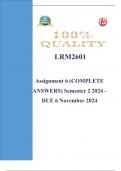LRM2601
Assignment 6 (COMPLETE
ANSWERS) Semester 2 2024 -
DUE 6 November 2024
,Read the case study and then answer the questions that follow. A TOUGH SITUATION
AT GOLDEN WHEELS TRANSPORT SERVICES Sipho is a young, ambitious man pursuing
a Diploma in Logistics Management through a part-time programme at the University of
South Africa. As the primary breadwinner for his family, he supports his younger sister,
who is still in school, and his mother, a former domestic worker now unable to work due
to severe arthritis. Recently, Sipho secured a job as a junior dispatcher at Golden Wheels
Transport Services, a Johannesburg-based logistics company specialising in transporting
goods across South Africa.
QUERY 1
1.1 Instance of Perceived Distributive Injustice: A particular illustration of distributive
injustice in this case is the reduction of employees' overtime compensation, a
substantial component of their income, while senior managers, including Mr. Mkhize,
persist in receiving annual bonuses despite the company's financial difficulties.
The equity criteria assesses fairness by examining the proportional relationship between
people' contributions and their corresponding benefits. Employees perceive this move
as inequitable, as they work extended hours and depend on overtime for financial
stability, yet are deprived of this crucial revenue while senior managers earn bonuses.
This disparity in compensation compromises the perceived equity of income distribution
within the organization, as individuals reliant on overtime wages are disadvantaged,
while senior staff continue to enjoy supplementary benefits.
, 1.2 Illustration of Perceived Procedural Injustice: An instance of procedural injustice
occurs when Mr. Mkhize convened a meeting to elucidate the decrease of overtime yet
prohibited employees from posing questions, offering recommendations, or
deliberating alternate cost-saving measures. Furthermore, when Sipho suggested
investigating alternative methods to minimize expenses without impacting overtime, Mr.
Mkhize categorically rejected his proposal.
Clarification Utilizing Procedural Justice Standards:
Representativeness: This criterion mandates that all stakeholders affected by a decision
must have their perspectives taken into account during the decision-making process.
Mr. Mkhize prohibited employees from expressing their ideas or suggesting alternatives
during the discussion, thereby neglecting to represent their interests in the decision-
making process. The absence of representation caused employees to view the process
as dismissive and inequitable.
Bias Suppression: Bias suppression necessitates that decision-makers refrain from
prejudice and personal biases. In this instance, Mr. Mkhize exhibited partiality towards
senior management by neglecting the employees' requirement for overtime
compensation while maintaining bonuses for upper-level executives. His dismissive
reaction to employees' proposals and concerns indicates a bias toward management,
exacerbating employees' view of an inequitable and unilateral procedure.
1.3 Clarification of Perceived Injustice and Its Effect on Trust: Mr. Mkhize's actions
were regarded as unjust due to his reduction of vital income for employees and his





